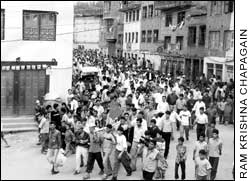
We can argue for hours about whether they actually support the Maoists or not. But one glaring, indisputable hard reality must be faced: the people of the countryside are not actively opposing the rebels, whether or not they back them.
On a recent trip to Mude, to look into the tragic death of Mohan Khatri (casualties of this "people's war" always seem more tragic when they're known to you) we stopped many times to take the local temperature. Arbitrary, inaccurate, hopelessly shallow, our straw poll was all of these and more, and yet I have no doubts about the sense of hopelessness and passivity that oozed from every tea shop, every bus stand, every chautari.
In Mude, the people express sorrow over the death of a kind and active citizen. Mohan Khatri mattered to that town. Yet ask people why they believe he was murdered, and they mutter that he was doing the wrong thing by helping the army train its officer recruits. A few people hide behind their hands and condemn the Maoists who murdered Khatri, but no one thinks that anything can be done about it.
They laugh when you mention the police, they look mystified when questioned about the army's intentions, they have no idea if there are other brave souls who might resume Mohan Khatri's good works. As for the authorities in Kathmandu, "Government, what government," wheezed an old man, speaking around his cigarette, "there hasn't been any development, any government here for years."
Similar scenes and encounters abounded in other places. Tinpiple in Kavre, under the eye of a shiny new training complex for Nepali UN peacekeepers, at least had a functioning VDC office. But no one wanted to talk to strangers about Maoists. The most expansive response to our queries was a finger swirled in the air, meaning "they're all around".
In Kushadevi village, along a rutted track just outside Panauti, what should be a prosperous community huddles in fear and anticipation. A local official talks volubly and anonymously about the death of Ryale VDC chairman Krishna Prasad Sapkota of the UML a few months aback. He was one of those few, one of the last probably, who stood up to oppose Maoist influence in his village. He was beheaded at midnight during the last Nepal bandh. Now his village waits for the next visit by those demanding money or recruits, and families quietly migrate to Kathmandu and poverty.
The unreality begins at Bhaktapur and worsens as you drive past Thimi and Gathinagar, finally reaching Tinkune and dear old Kathmandu. Wai-wai and cola signs bloom like weeds, a mini-property boom sees paddy terraces fall to brick houses and shops. The roads are choked with vehicles, the air is foul. The smell is of money being spent frantically before either official or unofficial tax collectors come calling. Signs on government buildings boast of lavish and largely meaningless programs jointly funded with international agencies. The frantic bustle eclipses fear, the city ignores the tightening steel band that even now seems to be squeezing the edges of the Valley of Unreality.
In Kathmandu, a prime minister rightly calls for peace talks, and gamely promises elections and relief to the people. In the countryside, those who've long lost faith in the capital city's ability to solve their problems await-passively-the next instalment of their wretched fate. They've given up trying to influence their futures, unless forced to. The rift widens, and nature hates a vacuum, especially when it's ignored by those who have the means but not the will to fill it.
And I don't just mean the politicians, I mean everyone in this city. Why help the people when there's black money to spend, intrigue to enjoy, a looming threat to deny.
All this is from a quick trip up the Arniko Highway and the road to Jiri. Imagine what it's like along the rutted road to Libang, the track through Jajarkot, the trading trails of Pyuthan, Surkhet and Rukum.
 Funeral procession of Krishna Prasad Sapkota, former chairman of Ryale VDC, Kavre, on 16 September. Sapkota was beheaded near his home by Maoists on the night of 15 September. The photo shows a mourner, at left, carrying his head in a plastic bag, as the rest of the body is borne on a stretcher.
Funeral procession of Krishna Prasad Sapkota, former chairman of Ryale VDC, Kavre, on 16 September. Sapkota was beheaded near his home by Maoists on the night of 15 September. The photo shows a mourner, at left, carrying his head in a plastic bag, as the rest of the body is borne on a stretcher. 


